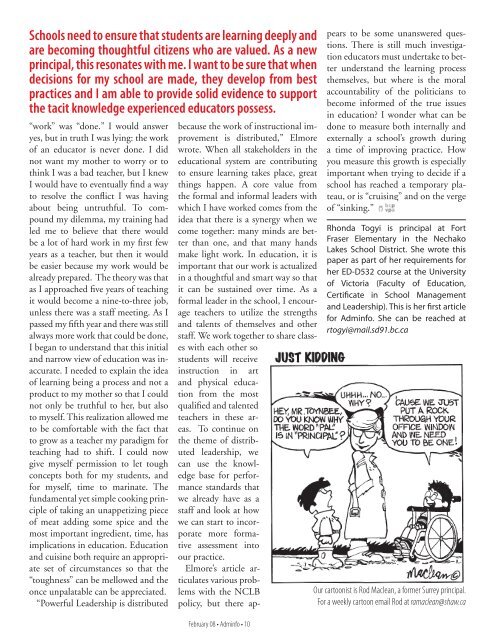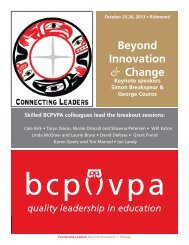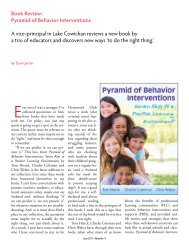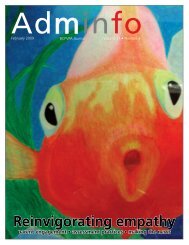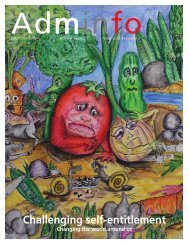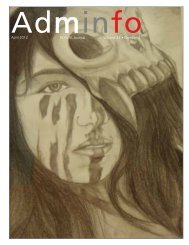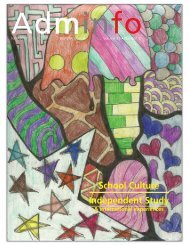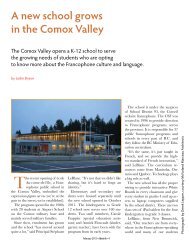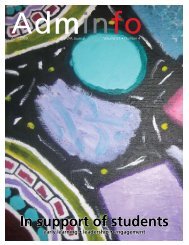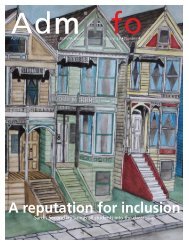Adminfo - and Vice Principals
Adminfo - and Vice Principals
Adminfo - and Vice Principals
You also want an ePaper? Increase the reach of your titles
YUMPU automatically turns print PDFs into web optimized ePapers that Google loves.
Schools need to ensure that students are learning deeply <strong>and</strong><br />
are becoming thoughtful citizens who are valued. As a new<br />
principal, this resonates with me. I want to be sure that when<br />
decisions for my school are made, they develop from best<br />
practices <strong>and</strong> I am able to provide solid evidence to support<br />
the tacit knowledge experienced educators possess.<br />
“work” was “done.” I would answer<br />
yes, but in truth I was lying: the work<br />
of an educator is never done. I did<br />
not want my mother to worry or to<br />
think I was a bad teacher, but I knew<br />
I would have to eventually find a way<br />
to resolve the conflict I was having<br />
about being untruthful. To compound<br />
my dilemma, my training had<br />
led me to believe that there would<br />
be a lot of hard work in my first few<br />
years as a teacher, but then it would<br />
be easier because my work would be<br />
already prepared. The theory was that<br />
as I approached five years of teaching<br />
it would become a nine-to-three job,<br />
unless there was a staff meeting. As I<br />
passed my fifth year <strong>and</strong> there was still<br />
always more work that could be done,<br />
I began to underst<strong>and</strong> that this initial<br />
<strong>and</strong> narrow view of education was inaccurate.<br />
I needed to explain the idea<br />
of learning being a process <strong>and</strong> not a<br />
product to my mother so that I could<br />
not only be truthful to her, but also<br />
to myself. This realization allowed me<br />
to be comfortable with the fact that<br />
to grow as a teacher my paradigm for<br />
teaching had to shift. I could now<br />
give myself permission to let tough<br />
concepts both for my students, <strong>and</strong><br />
for myself, time to marinate. The<br />
fundamental yet simple cooking principle<br />
of taking an unappetizing piece<br />
of meat adding some spice <strong>and</strong> the<br />
most important ingredient, time, has<br />
implications in education. Education<br />
<strong>and</strong> cuisine both require an appropriate<br />
set of circumstances so that the<br />
“toughness” can be mellowed <strong>and</strong> the<br />
once unpalatable can be appreciated.<br />
“Powerful Leadership is distributed<br />
February 08 • <strong>Adminfo</strong> • 10<br />
because the work of instructional improvement<br />
is distributed,” Elmore<br />
wrote. When all stakeholders in the<br />
educational system are contributing<br />
to ensure learning takes place, great<br />
things happen. A core value from<br />
the formal <strong>and</strong> informal leaders with<br />
which I have worked comes from the<br />
idea that there is a synergy when we<br />
come together: many minds are better<br />
than one, <strong>and</strong> that many h<strong>and</strong>s<br />
make light work. In education, it is<br />
important that our work is actualized<br />
in a thoughtful <strong>and</strong> smart way so that<br />
it can be sustained over time. As a<br />
formal leader in the school, I encourage<br />
teachers to utilize the strengths<br />
<strong>and</strong> talents of themselves <strong>and</strong> other<br />
staff. We work together to share classes<br />
with each other so<br />
students will receive<br />
instruction in art<br />
<strong>and</strong> physical education<br />
from the most<br />
qualified <strong>and</strong> talented<br />
teachers in these areas.<br />
To continue on<br />
the theme of distributed<br />
leadership, we<br />
can use the knowledge<br />
base for performance<br />
st<strong>and</strong>ards that<br />
we already have as a<br />
staff <strong>and</strong> look at how<br />
we can start to incorporate<br />
more formative<br />
assessment into<br />
our practice.<br />
Elmore’s article articulates<br />
various problems<br />
with the NCLB<br />
policy, but there appears<br />
to be some unanswered questions.<br />
There is still much investigation<br />
educators must undertake to better<br />
underst<strong>and</strong> the learning process<br />
themselves, but where is the moral<br />
accountability of the politicians to<br />
become informed of the true issues<br />
in education I wonder what can be<br />
done to measure both internally <strong>and</strong><br />
externally a school’s growth during<br />
a time of improving practice. How<br />
you measure this growth is especially<br />
important when trying to decide if a<br />
school has reached a temporary plateau,<br />
or is “cruising” <strong>and</strong> on the verge<br />
of “sinking.”<br />
Rhonda Togyi is principal at Fort<br />
Fraser Elementary in the Nechako<br />
Lakes School District. She wrote this<br />
paper as part of her requirements for<br />
her ED-D532 course at the University<br />
of Victoria (Faculty of Education,<br />
Certificate in School Management<br />
<strong>and</strong> Leadership). This is her first article<br />
for <strong>Adminfo</strong>. She can be reached at<br />
rtogyi@mail.sd91.bc.ca<br />
Our cartoonist is Rod Maclean, a former Surrey principal.<br />
For a weekly cartoon email Rod at ramaclean@shaw.ca


